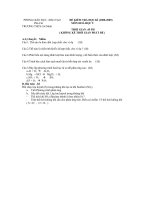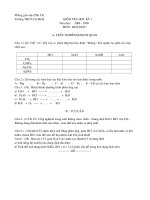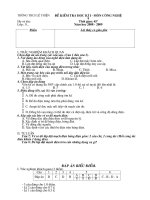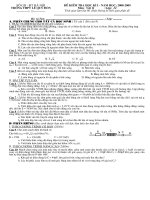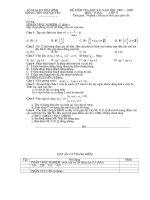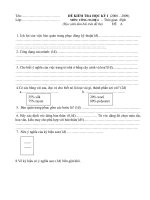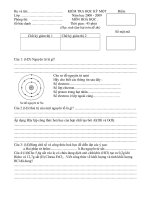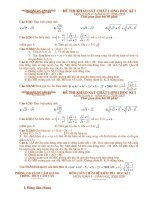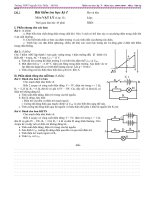- Trang chủ >>
- Đề thi >>
- Đề thi lớp 5
KT HK I E10
Bạn đang xem bản rút gọn của tài liệu. Xem và tải ngay bản đầy đủ của tài liệu tại đây (87.25 KB, 14 trang )
<span class='text_page_counter'>(1)</span><div class='page_container' data-page=1>
Date of teaching:
Class : 11 A1
Period : 50th
<b>REVIEW LESSON (1)</b>
<b>* Aims and objectives:</b>
+ To help students review what they learnt from Unit 1 to Unit 8.
+ To help students improve their English by doing some exercises.
<b>* Language content:</b>
<b> + tenses of verbs.</b>
+ gerunds and infinitives.
+ passive gerunds and infinitives.
+ Reported speech
<i><b>Exercise 1: Choose the correct answer:</b></i>
1. Have you ever ... a fire?
A. see B. saw C. seeing D. seen
2. The fire ... some years ago at Dong Xuan market.
A. happen B. happened C. happening D. happens
3. The fire was great and it ... a lot of things.
A. destroyed B. destroys C. destroy D. is destroying
4. I was going home when I ... an accident.
A. see B. was seeing C. saw D. had seen
5. My sister wrote this poem when she ... 10 years old.
A. is B. be C. has been D. was
6. I phoned you last night, but you were out. Where ... you ...?
A. do... go B. have ... gone C. did ... go D. had ... gone
7. The house was in great disorder because he ... it.
A. was decorating B. decorated C. has decorated D. is decorating
8. Where ... when you saw him last?
A. does he live B. did he live C. has he lived D. is he living
9. The traffic was making so much noise that I couldn’t hear what he ...
A. said B. says C. say D. was saying
10. When I arrived at the meeting, the first speaker ... speaking and the audience was
clapping.
A. just finishes B. had just finished C. has just finished D. just finished
11. You looked very busy when I saw you yesterday morning. What ...?
A. were you doing B. are you doing B. had you done D. did you do
12. He looked at me angrily when I ... him.
A. interrupt B. am interrupting C. was interrupting D. interrupted
13. When I returned home after 20 years, everything ...
</div>
<span class='text_page_counter'>(2)</span><div class='page_container' data-page=2>
A. are B. have been C. were D. had been
15. By the time the movie finished, many audience ... the movies.
A. left B. have left C. leave D. had left
<i><b>Exercise 2: Choose the correct answer:</b></i>
1. Are you going ... your 25th <sub> wedding anniversary?</sub>
A. celebrate B. to celebrate C. celebrating D. celebrated
2. I am glad you decided... to my party.
A. come B. coming C. came D. to come
3. Everyone seems ... a good time at her party.
A. have B. has C. to have D. having
4. I like ..., but I also enjoy meals out at restaurants.
A. to cook B. cook C. cooking D. cooked
5. I shall never forget ...her for the first time.
A. to meet B. meeting C. meet D. met
6. Alice didn’t expect ... to Jim’s party.
A. inviting B. being invited C. to invite D. to be invited
7. Most people don’t need ... financially once they have found reasonable jobs.
A. support B. supporting C. to support D. supported
8. We’ve arranged ... outside the school at 5 o’clock.
A. to meet B. meeting C. meet D. met
9. He doesn’t allow us ... personal phone calls.
A. to make B. make C. making D. to be made
10. he tried to avoid ... my questions.
A. to answer B. answer C. answering D. to be answered
11. Would you like ... orange juice?
A. have B. having C. to have D. had
12. In stead of ... about the good news, Tom seems to be indifferent.
A. exciting B. to excite C. being excited D. to be excited
13. Mary’s children are used to ... up after school everyday.
A. picking B. pick C. be picked D. being picked
14. They raise money ... their study and expand their school activities.
A. to continue B. continue C. continuing D. continued
15. She is looking forward to ... you again.
A. meet B. meeting C. met D. be met
16. ... photographs of the place, I had no desire to go there.
A. have seen B. Had seen C. having seen D. To have seen
17. ... the story before, she didn’t want to hear the story again.
A. Visited B. have visited C. Having visited D. Visiting
18. I saw her ... the staff room.
A. to enter B. enter C. entering D. entered
19. It’s no good ... to him, he never answers letters.
A. write B. writing C. being written D. to write
</div>
<span class='text_page_counter'>(3)</span><div class='page_container' data-page=3>
A. read B. to read C. reading D. are reading
21. I have heard that musician ... the piano.
A. played B. plays C. play D. to play
<b>Name:………. FIFTEEN MINUTE TEST</b>
Class: 11 A2
<b>I. Rewrite the sentences: (6 points)</b>
1. I didn’t meet him because I missed the bus.
-> If ………
2. Study hard or you’ll fail the exam.
-> If ………
3. She never takes any exercises; that’s why she is so unhealthy.
-> If ………
<b>II. Complete the sentences: (4 points)</b>
1. I would visit you very often if ………
2. If you like this film,.……….
………..
<b>Name:………. FIFTEEN MINUTE TEST</b>
Class: 11 A2
<b>I. Rewrite the sentences: (6 points)</b>
1. She was so busy, so she couldn’t come to help me.
-> If ………
2. Study hard or you’ll fail the exam.
-> If ………
3. She is very shy; that’s why she doesn’t enjoy parties.
-> If ………
<b>II. Complete the sentences: (4 points)</b>
</div>
<span class='text_page_counter'>(4)</span><div class='page_container' data-page=4>
<b>Name:………. FIFTEEN MINUTE TEST</b>
Class: 11 A7
<b>I. Use the correct form of the verbs in the brackets: (6 points)</b>
1. If he (pay) ………..me tonight, I ‘ll have enough money to buy the tickets.
2. If I (see)……… a tiger walking across Hyde Park, I would climb the tree.
3. I (get)……….up earlier if you had phoned me.
4. He might get fat if he (stop) ………smoking.
<b>II. Complete the sentences with </b><i><b> someone, anyone, no one or everyone</b></i><b> : (4 points)</b>
1. Do you know ………in your school English club?
2. After he finished his excellent talk, ………..stood up and clapped their hands.
3. George didn’t come to the party and ……… knows why.
4. ……….wants to be his friends because he is so selfish.
<b>Name:………. FIFTEEN MINUTE TEST</b>
Class: 11 A7
<b>I. Use the correct form of the verbs in the brackets: (6 points)</b>
1. If you (catch) ………..the first train, you‘ll arrive here at 5 p.m.
2. If I (not be)……… busy, I would help you.
3. I (meet)……….him if I hadn’t missed the train.
4. He might get fat if he (stop) ………smoking.
<b>II. Complete the sentences with </b><i><b> someone, anyone, no one or everyone</b></i><b> : (4 points)</b>
1. Do you know ……….…in your school English club?
2. ………..……….wants to be his friends because he is so selfish.
3. George didn’t come to the party and ………….……… knows why.
</div>
<span class='text_page_counter'>(5)</span><div class='page_container' data-page=5>
Date of teaching:
Class : 11 A1
Period : 51st
<b>REVIEW LESSON (2)</b>
<b>* Aims and objectives:</b>
+ To help students review what they learnt from Unit 1 to Unit 8.
+ To help students improve their English by doing some exercises.
<b>* Language content:</b>
<b> + reported speech</b>
+ vocabulary
<i><b>Exercise 1: Choose the second sentence that is similar in meaning with the given ones:</b></i>
<i><b>1. John said” You’d better not lend them any more money, Daisy”</b></i>
A. John said Daisy not to lend them any money. B. John said to Daisy not to lend them any
money.
C. John advised Daisy should not lend them any money. D. John advised Daisy not to lend them any
money.
<i><b>2. “ Let’s organize a club meeting on Saturday.”</b></i>
A. We have to organize a club meeting on Saturday.
B. She suggested organizing a club meeting on Saturday.
C. She offered to organize a club meeting on Saturday.
D. We are suggested to organize a club meeting on Saturday.
<i><b>3. “Shall I post the letter for you?”</b></i>
A. He asked me if I should post the letter for him. B. He offered to post the letter for me.
C. he wanted me to post the letter myself. . D. I want him to post the letter for me.
<i><b>4. He said,” I’m sorry I didn’t reply to the letter”</b></i>
A. He apologized for not to reply to the letter. B. He apologized for not to replying to the letter.
C. He apologized for did not reply to the letter. D. He apologized for not replying to the letter.
<i><b>5. “ Don’t leave the house until I get back, John,” his sister said.</b></i>
</div>
<span class='text_page_counter'>(6)</span><div class='page_container' data-page=6>
C. John’s sister told him not to go out untill she got back.
D. John’s sister told him to stay at home till she got back.
<i><b>6. “ Don’t forget to buy the present, ” Jane said</b></i>
A. Jane advised me not to forget to buy the present.
B. Jane told me not to forget to buy the present.
C. Jane reminded me not to forget to buy the present.
D. Jane encouraged me not to forget to buy the present.
<i><b>7. “ Would you like to go to the movie tonight, Lan? “ Minh said.</b></i>
A. Minh said to Lan that he like Lan to go to the movie tonight.
B. Minh invited Lan to go to the movie that night.
C. Minh suggested Lan to go to the movie that night.
D. Minh asked Lan to go to the movie that night.
<i><b>8. “ Why don’t we all go out fro a drink?” Jane said.</b></i>
A. Jane asked why they didn’t go out for a drink. B. Jane suggested going out fro a drink.
C. Jane wanted them to go out for a drink. D. Jane invited them to go out for a drink.
<i><b>9. “ I’ll give it to him tomorrow” Tom said</b></i>
A. Tom told that he would give it to him tomorrow.
B. Tom promised to give it to him tomorrow.
C. Tom promised to give it to him the following day.
D. Tom agreed to give it to him the following day.
<i><b>10. “Alright, I’ll wait for you,” Linh said to Minh.</b></i>
A. Linh agreed to wait for Minh. C. Linh waited Minh
B. Linh wanted to wait Minh D. Linh suggested waiting for Minh
<i><b>Exercise 2: Choose the correct answer</b></i>
1. The local people are very ... to strangers.
A. comfortable B. hospitable C. enjoyable D. familiar
2. Can you write an article telling about one of your most memorable past ...?
A. experiences B. experience C. experiencing D. experienced
3. Be calm. Don’t make ... over that affair.
A. something B. a fuss C. acquaintance D. stories
4. How ... have your parents been married?
A. far B. long C. age D. time
5. What activities often ... at a birthday party?
A. take part in B. take over C. happen D. take place
6. I’m very busy, so I had only time to ... at newspapers.
A. look B. stare C. see D. glance
7. The south of the country was worst ... by the drought.
A. affect B. affected C. affectedly D. effect
8. Nga and Loan were the... of our class to take part in the game.
</div>
<span class='text_page_counter'>(7)</span><div class='page_container' data-page=7>
Date of teaching:
Class : 11 A1
Period : 52nd
<b>REVIEW LESSON (3)</b>
<b>* Aims and objectives:</b>
+ To help students review what they learnt from Unit 1 to Unit 8.
+ To help students improve their English by doing some exercises.
<b>* Language content:</b>
<b> + reading comprehension</b>
<i><b>Exercise 1 : Read the passage and answer the questions below:</b></i>
Amelia Earhart was a famous aeroplane pilot. She was born in Atchison, Kansas in 1898. When
she was 22, she stopped her studies at Columbia University, New York, to learn to pilot a plane.
Flying lessons were expensive and she took several jobs to pay for them: once she worked as a lorry
driver because the pay was good. In 1932 she was the first woman to fly her own plane across the
Atlantic, from Newfoundland to Ireland.
1. Who was Amelia Earhart? -> ...
2. When and was she born? - > ...,,
3. Why did she stop her studies at Columbia University?
-> ...
4. What did she do to pay for her flying lessons?
-> ...
<i><b>Exercise 2 : Read the passage and choose the correct answer:</b></i>
Alfred Nobel was born on October 21, 1833 in Sweden. His important invention was
dynamite- a powerful explosive. This dynamite business made him a very rich man.
</div>
<span class='text_page_counter'>(8)</span><div class='page_container' data-page=8>
were lost because other explosives were dangerous to use. He hated violence and war. And he did not
like the world to think of him as a man of war.
He thought of the best way for people to use his fortune for years. Finally he knew what to do
with his fortune. Alfred Nobel established the Nobel Prize, an annual award to honor leaders of
science, literature and world peace.
Alfred Nobel died on December, 1896. He was unmarried and had no children. His important
decision changed the way the world thought of him. He was remembered the way he wanted: Alfred
Nobel, a man of peace.
1. Dynamite, invented by Alfred Nobel, is ...
A. a business B. and explosive C. a king D. a prize
2. Alfred Nobel invented dynamite ...
A. to make money B. to make war C. to be “ The Dynamite King” D. to save
people’s lives
3. The newspaper called him a salesman of death when ...
A. he invented dynamite B. he died C. his brother died D. he became a rich man
4. Alfred Nobel died at the age of ...
A. Thirty-three B. sixty C. sixty-three D. ninety-six
5. The Nobel Prize is awarded to leaders of science, literature and world peace ...
A. every year B. every month C. every two years D. every four years
<i><b> Exercise 3 : </b></i>
<b>A. Galileo Galileo was born in Pisa, Italy, in 1564 . He was a mathematician, astronomer and </b>
physicist and made valuable discoveries in all these fields. For, example, he discovered sunspots for
the first time. Galileo was a student at the University of Pisa when he was young and later a professor
at different universities in Italy. He was famous for his lectures, and students came from over Europe
to hear them.
<b>B. Amelia Earhart was a famous aeroplane pilot. She was born in Atchison, Kansas in 1898. When </b>
she was 22, she stopped her studies at Columbia University, New York, to learn to pilot a plane.
Flying lessons were expensive and she took several jobs to pay for them: once she worked as a lorry
driver because the pay was good. In 1932 she was the first woman to fly her own plane across the
Atlantic, from Newfoundland to Ireland.
<b>C. Marie Skolodowska was born in Warsaw, Poland in 1867. She later went to Paris, where she met </b>
and married Pierre Curie. The Curies were both physicists, and became famous for their work. One of
their first discoveries was the element radium. They were both professors of physics at the Sorbonne,
and they shared the Nobel Prize for physics in 1903.
<b>1. Match the names with the phrases</b>
1. Galileo a. Nobel Prize
2. Earhart b. lorry driver
3. The Curies c. famous for lectures
2. Match the word in A with its definition or meaning in B:
1. astronomer
2. sunspot
3. lecture
a. a person who flies a plane
b. have or use something with others
</div>
<span class='text_page_counter'>(9)</span><div class='page_container' data-page=9>
5. share
6. radium e. an educational speech on a particular subject made before an audience
f. dark patch on the sun
<b>3. Decide whether the statements are True (T) or False ( F):</b>
a. Galileo made valuable discoveries in such fields as mathematics, astronomy and physics.
b. Galileo was a professor at different universities In Italy when he was very young.
c. Galileo discovered sunspots for many times.
d. Marie Curie met Pierre Curie in Poland.
e. The Curies were famous for their discoveries, one of which was the element radium.
f. They were awarded the Nobel Prize for physics in 1930.
g. Amelia Earhart was a famous aeroplane pilot.
h. Amelia stopped her studies because she was too poor.
</div>
<span class='text_page_counter'>(10)</span><div class='page_container' data-page=10>
Date of teaching: 18/12/08
Class : 11 A2, 13
Period : 48th
<b>REVIEW LESSON (1)</b>
<b>* Aims and objectives:</b>
+ To help students review what they learnt from Unit 1 to Unit 8.
+ To help students improve their English by doing some exercises.
<b>* Language content:</b>
<b> + Tenses of verbs.</b>
+ Gerunds and infinitives.
+ Passive gerunds and infinitives.
+ Reported speech
+ Part of speech in sentences
<i><b>Exercise 1: Give the correct form of the verbs in the brackets</b></i>
1. He (break)………..his arm in an accident last year.
2. Mr. Pike is a bank manager. He (be) ………here for 5 years.
3. He kept looking at her, wondering where he (see)……….her before.
4. I thanked her for what she (do) …………..for me.
5. By the time Sheila got back, Chris (go) ………..
6. The room smelt terrible. Someone (smoke)…………..before I came.
7. I (phone)…………you twice yesterday and (get)…………no answer.
8. When I (look) ………….for my passport, I found this old photo.
9. When I came, they(sit)………….in the sitting room. Mr Brown (read)…………. a newspaper. Mrs
Brown (watch)………..TV. They (smile)………….at me and (ask) …………..me in.
10. When he was 15, he (run)………….away from home.
<i><b>* The key:</b></i>
<i>1. broke 6. had smoked</i>
<i>2. has been 7. phoned ………..got</i>
<i>3. had seen 8. was looking</i>
<i>4. had done 9. Were sitting / was reading / was watching/ smiled/ asked.</i>
<i>5. had gone 10. ran</i>
<i><b>Exercise 2: Change into reported speech:</b></i>
1. “ If I were you, I wouldn’t go with him, “ Jane said to me.
-> Jane advised………
2. “I’m sorry that I’ve broken the glass, “ said Peter.
</div>
<span class='text_page_counter'>(11)</span><div class='page_container' data-page=11>
4. “Let’s go for a walk in the park,” she said.
-> She suggested………
5. “Me? No, I didn’t take Sue’s calculator,” said Bob.
-> Bob denied………
6. “Don’t forget to join the contest tomorrow,” Lan said to me.
-> Lan reminded………
7. “Would you like me to clean the room for you, “ Jane said to John.
-> Jane offered………
8. It was very kind of you to help me with my homework, “ I said to Lan.
-> I thanked ………
<i><b>* The key:</b></i>
<i>1. Jane advised me not to go with him.</i>
<i>2. Peter apologized for having broken the glass.</i>
<i>3. John warned us not to walk/ against walking on the ice because it was slippery.</i>
<i>4. She suggested going for a walk in the park.</i>
<i>5. Bob denied having taking Sue’s calculator.</i>
<i>6. Lan reminded me to join the contest the following day.</i>
<i>7. Jane offered to clean the room for John.</i>
<i>8. I thanked Lan for helping me with my homework.</i>
<i><b>Exercise 3: Use the correct form of the words in the brackets:</b></i>
1. What should we do so that our …………..can last long? (FRIEND)
2. ………..is one of the qualities of a true friendship. (LOYAL)
3. He is a business businessman. (SUCCESS)
4. A good friend always helps us out of ………(DIFFICULT)
5. Is there any ………..between a frog and a toad? (DIFFER)
6. Have you ever been ………..ill? (SERIOUS)
7. She ………opened the boxes of gifts. (CAREFUL)
8. She left without ………..a word. (SAY)
9. What ………..do people often do on Tet holiday? (ACT)
10. In the United States, people of all ………..celebrate birthdays. ( OLD)
<i><b>* The key:</b></i>
1. Friendship 6. seriously
2. Loyalty 7. carefully
3. successful 8. saying
4. difficulties 9. Activities
5. differences 10. ages
</div>
<span class='text_page_counter'>(12)</span><div class='page_container' data-page=12>
Date of teaching: 19/12/08
Class : 11 A2, 13
Period : 49th
<b>REVIEW LESSON (2)</b>
<b>* Aims and objectives:</b>
+ To help students review what they learnt from Unit 1 to Unit 8.
+ To help students improve their English by doing some exercises.
<b>* Language content:</b>
<b> </b> + Conditional sentences.
+ Part of speech in sentences
<i><b>Exercise 1: Rewrite the sentences, beginning with “If……..”</b></i>
1. I didn’t meet him because I missed the bus.
-> If………
2. I couldn’t buy a motor because I was still poor.
-> If………
3. She doesn’t take any exercises; that’s why she is so unhealthy.
-> If………
4. She doesn’t have a bicycle, so she has to walk to school
-> If………
5. Go jogging every day and then you can lose weight.
-> If………
6. I am not a rich businessman and I can’t afford to buy an expensive car.
-> If………
7. My parents do not allow me to go out, so I stay at home.
-> If………
8. Study hard or you’ll fail the exam.
-> If………
<i><b>* The key:</b></i>
<i>1. If I hadn’t missed the train, I would have met him.</i>
<i>2. If I had been rich, I would have bought a motorbike.</i>
<i>3. If she took some exercises, she wouldn’t be so unhealthy.</i>
<i>4. If she had a bicycle, she wouldn’t have to walk to school </i>
<i>5. If you go jogging everyday, you can lose weight.</i>
</div>
<span class='text_page_counter'>(13)</span><div class='page_container' data-page=13>
<i><b>Exercise 2: Use the correct form of the words in the brackets:</b></i>
1. We’d like to offer your school a …………..of 2 million Dong. (DONATE)
2. We participate in a campaign to provide ………for poor children. (EDUCATE)
3. ……….is one of the causes of poverty. (LITERATE)
4. The happiest people are those who bring ………..to others. (HAPPY)
5. Nowadays more and more people ……….take care of others. (VOLUNTEER)
6. I think this is an ………….way to help them. (EFFECT)
7. I’d like to know some information about the ………..(COMPETE)
8. What re the problems of world………(EXPLODE)
9. Your good …………..will help you succeed. (PREPARE)
10. Have you ever been in an ……….situation? (EMBARRASS)
<i><b>* The key:</b></i>
<i>1. Donation 6. effective</i>
<i>2. Education 7. competition</i>
<i>3. Illiteracy 8. explosion</i>
<i>4. happiness 9. preparation</i>
<i>5. voluntarily 10. embarrassing</i>
<i><b> Exercise 3: Read the passage and answer the questions below:</b></i>
Amelia Earhart was a famous aero plane pilot. She was born in Atchison, Kansas in 1898.
When she was 22, she stopped her studies at Columbia University, New York, to learn to pilot a
plane. Flying lessons were expensive and she took several jobs to pay for them: once she
worked as a lorry driver because the pay was good. In 1932 she was the first woman to fly her
own plane across the Atlantic, from Newfoundland to Ireland.
1. Who was Amelia Earhart?
2. When and where was she born?
3. Why did she stop her studies at Columbia University?
4. What did she do to pay for her flying lessons?
<i><b>* The key:</b></i>
1. Earhart was a famous aero plane pilot
2. She was born in Atchison, Kansas in 1898.
3. She stopped her studies at Columbia University, New York, to learn to pilot a plane.
4. She took several jobs to pay for them: once she worked as a lorry driver because the pay
was good
</div>
<span class='text_page_counter'>(14)</span><div class='page_container' data-page=14></div>
<!--links-->
